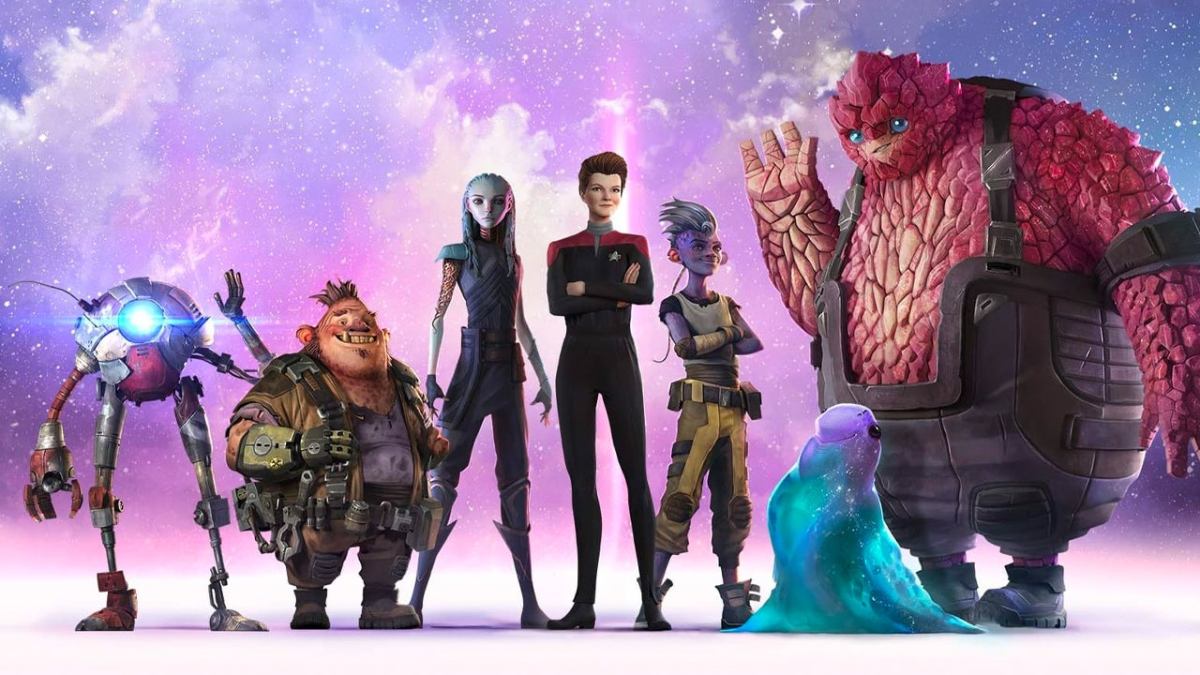Last week Star Trek: Prodigy concluded the first half of its first season, ending on a surprise cameo and one hell of a cliffhanger. The animated Paramount+ series has had a slow rollout, but what has becoming increasingly clear over time is that Star Trek: Prodigy is the best Trek on TV right now. It captures the adventure, tone, themes, and je ne sais quoi of the beloved franchise far better than any other series that Paramount has dropped since Alex Kurtzman took control and launched this new wave of Star Trek content on Paramount+.
For the uninitiated, Star Trek: Prodigy follows a group of ragtag characters who are enslaved on a mining asteroid in a distant part of the galaxy, so far away that many of them have never even heard of the Federation and what it means. The asteroid is under the control of the Diviner, who is mining for a Starfleet ship that crashed there called the Protostar. However, it is teenage alien Dal R’El who discovers it first alongside 8-year-old Rok-Tahk. They ultimately hijack the ship, alongside the Diviner’s daughter Gwyndala, a mechanic named Jankom Pog, and a non-corporeal alien named Zero. They also trigger a hologram training program based on Captain Janeway, who teaches them about the Federation as they begin exploring the galaxy while running away from the Diviner.
https://www.youtube.com/watch?v=EBE7d8sH5Rg
The series premise flirts with the generic sometimes, but it also captures Star Trek like no other Trek show on right now. It’s not just that it is a good TV series; it carries the core themes and values for which Star Trek was created. Comparatively, I’d argue that Star Trek: Discovery can be a good TV series at times, but it never feels like Trek — the reasons why have been espoused elsewhere and often.
Prodigy is built to introduce Star Trek to a new generation and, by doing so, strips back a lot of the trappings and barnacles that have clung onto the franchise over the decades. This is a show made to ask the question, “What does Star Trek mean?” and then, more importantly, actually provide an answer.
The very premise of the show launches us into a need for this answer. We have a cast of aliens (not a human on board this starship) forced into working together while being trained into a Starfleet crew. Obviously, they’re going to learn about things like the Prime Directive, first contact, and the values of exploration, peace, and endless curiosity that have been the groundwork for this franchise since The Original Series launched it. And because it’s a children’s show, the series isn’t afraid to be up front about those values. It’s not trying to hide its hope and wonder with the universe behind shades of gray. It proudly embraces an optimistic perspective about how to approach the future.

However, even if the themes are straightforward, that’s not to say Star Trek: Prodigy doesn’t have character nuance and growth. The cast of characters evolve as a family and crew (another key aspect of Trek). Del is a troubled youth who claims himself captain out of arrogance, Zero clearly suffers from PTSD as the Diviner used her as a weapon to harm people, Gwyn has daddy issues galore, Rok-Tahk is an eight-year-old thrust into very adult situations — her first response to a challenging situation in the episode “Time Amok” is to cry and run away.
The crew’s growth as they learn about the values of Starfleet is endearing. The moment they put on their Trek uniforms for the first time feels more triumphant than anything the franchise has produced since Voyager went off the air — because it’s clear by then what those uniforms represent.
It also helps to have a training hologram of Captain Janeway on board. There are, I’m sure, logistical reasons for Kate Mulgrew’s selection as the captain of choice here. Patrick Stewart is already starring in his own show, Avery Brooks is retired from acting and kind of crazy, and William Shatner would have wanted the show to be about him. The only other actor who maybe would have done it is Scott Bakula, but the only captain that makes sense is Janeway.

After all, the very premise of Voyager was to put a Federation starship into a world where its rules, values, and guiding principles were not known. While the series didn’t always dive into that premise effectively, Janeway was often the guiding light for those principles throughout the series. Of all the show’s captains, she is the clear choice to deliver what amounts to an education in Star Trek‘s values. And as the only female captain to lead a series, there is also a maternal component to her training a crew of children. This notion, complemented by the wry wit of Mulgrew’s performance, makes her selection not only wise but natural.
Of course, falling back on old characters raises the ugly specter of nostalgia. We’ve seen how it can entirely fail a series in Picard, overwhelming a show so much that it becomes nothing but a set of callbacks. Star Trek: Prodigy avoids this so far, even if the teaser at the end of the current cliffhanger is a little worrisome. It has navigated the minefield not just by removing the show from the Federation and building out a new cast of characters, but by using the franchise’s past to guide its future.

In the episode “Kobayashi,” the now-cliche no-win training program the Kobayashi Maru and a slew of classic characters are used to — get this — actually teach someone about there being no-win situations. In “First Con-tact,” the Prime Directive comes up against Ferengi greed with nearly disastrous results, delivering what is possibly the first time ever that a Ferengi plotline has actually been harrowing. There are callbacks and references like this littered throughout the first 10 episodes, but they’re used to guide, not define, and it makes all the difference. This is probably also a good time to mention that the show’s opening sequence is a wonderfully remixed throwback to the classic show’s style, with a riveting theme played over the Protostar cruising around a galaxy filled with planet-like versions of the show’s characters.
Finally, there is the return to episodic storytelling. While Star Trek: Prodigy does have a running plotline throughout the series and three two-parters in 10 episodes, it is nonetheless an episodic series. An overarching storyline is not the show’s only concern, and its modular structure allows for episode-specific themes to be explored in a way Discovery simply doesn’t. This style of show, coupled with the underlying thesis of introducing newcomers to the franchise, allows for thematically rich episodes that focus not on some universe-ending threat for 10 hours straight but on smaller, nuanced challenges about friendship, morality, loyalty, and “humanity.” It truly highlights just how effective episodic storytelling has been to Star Trek, allowing the franchise to explore drastically different themes every week, all couched in the wrappings of (usually) a starship.

I would be remiss not to mention that Star Trek: Lower Decks, Paramount+’s more adult-oriented animated Star Trek series, captures a lot of the same magic. However, that show is more a lovingly crafted parody than an actual Star Trek series. And while Lower Decks is good at driving home the values and themes of the franchise, thanks to its comedic slant it feels removed from the greater universe. It’s great, but it isn’t full-blown Trek and so doesn’t scratch that itch that Star Trek fans have been looking for since it was announced that Paramount was kicking off a new slate of series.
In many ways Star Trek: Prodigy parallels Discovery far more than Lower Decks. The series features a misfit crew on a ship with a strange, new engine that can travel faster than anything we’ve seen before. It features older, classic characters from Star Trek and places its new characters into their world. It features a season-long mystery that closely impacts its rebellious leader. However, thanks to a stripped-back construction, a better understanding of nostalgia, a target audience of children, and what seems to be a better understanding of the fundamentals of Star Trek, it truly feels like the progeny of all the classic series that came before it. Pulling at times from the revolutionary atmosphere of The Original Series, the philosophy of The Next Generation, the impeccable construction of Deep Space Nine, or the exploration of Voyager (or even Enterprise), Star Trek: Prodigy has genuinely continued on these shows’ rich heritage.






Published: Feb 10, 2022 11:00 am